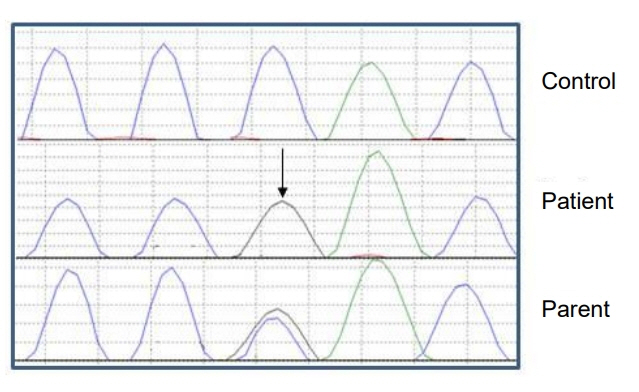Ann Pediatr Endocrinol Metab.
2020 Mar;25(1):42-45. 10.6065/apem.2020.25.1.42.
A homozygous mutation in the insulin gene (INS) causing autosomal recessive neonatal diabetes in Saudi families
- Affiliations
-
- 1King Abdulaziz Medical City, King Abdullah International Medical Research Center, King Saud bin Abdulaziz University for Health Sciences, Jeddah, Saudi Arabia
- 2Pediatric Endocrine & Diabetes Consultant, Endocrine & Diabetes Center, Alqounfudah General Hospital, Al Qunfudah, Saudi Arabia
- KMID: 2501036
- DOI: http://doi.org/10.6065/apem.2020.25.1.42
Abstract
- Purpose
Insulin gene (INS) mutations are a rare cause of permanent neonatal diabetes and mature-onset diabetes of the young (MODY10). Homozygous mutations have been reported to cause diabetes by decreasing insulin biosynthesis through distinct mechanisms. In this study, we report a homozygous mutation c.-331C>G in the INS gene causing autosomal recessive neonatal diabetes in Saudi families and share our experience with diagnosis and management.
Methods
We retrospectively reviewed all cases diagnosed with diabetes during the first week of life. We identified 18 cases, and all underwent genetic testing to identify the cause. Most had mutations in common genes (9 in KCNJ11 and 5 in ABCC8). The inclusion criterion for this study was a mutation in the INS gene.
Results
Four patients from 3 Saudi families had mutations in the INS gene. All patients were born with low birth weight and were diagnosed with neonatal diabetes at the age of 2 days. Sanger sequencing analysis identified a homozygous INS pathogenic promoter variant, c.-331C>G. All patients were managed by insulin therapy. Two patients had persistent diabetes and in 2 cases diabetes resolved.
Conclusion
This report indicates that a homozygous mutation in the INS gene is a probable and important cause of neonatal diabetes in Saudi Arabia. The c.-331C>G variant in the INS gene identified in our study showed variability both within and between families and different outcomes ranging from early resolution of diabetes after 2 months of life to permanent diabetes.
Keyword
Figure
Reference
-
References
1. Meur G, Simon A, Harun N, Virally M, Dechaume A, Bonnefond A, et al. Insulin gene mutations resulting in early-onset diabetes: marked differences in clinical presentation, metabolic status, and pathogenic effect through endoplasmic reticulum retention. Diabetes. 2010; 59:653–61.
Article2. Støy J, Edghill EL, Flanagan SE, Ye H, Paz VP, Pluzhnikov A, et al. Insulin gene mutations as a cause of permanent neonatal diabetes. Proc Natl Acad Sci U S A. 2007; 104:15040–4.
Article3. Boesgaard TW, Pruhova S, Andersson EA, Cinek O, Obermannova B, Lauenborg J, et al. Further evidence that mutations in INS can be a rare cause of Maturity-Onset Diabetes of the Young (MODY). BMC Med Genet. 2010; 11:42.4. Polak M, Dechaume A, Cavé H, Nimri R, Crosnier H, Sulmont V, et al. Heterozygous missense mutations in the insulin gene are linked to permanent diabetes appearing in the neonatal period or in early infancy: a report from the French ND (Neonatal Diabetes) Study Group. Diabetes. 2008; 57:1115–9.5. Garin I, Edghill EL, Akerman I, Rubio-Cabezas O, Rica I, Locke JM, et al. Recessive mutations in the INS gene result in neonatal diabetes through reduced insulin biosynthesis. Proc Natl Acad Sci U S A. 2010; 107:3105–10.6. Piccini B, Artuso R, Lenzi L, Guasti M, Braccesi G, Barni F, et al. Clinical and molecular characterization of a novel INS mutation identified in patients with MODY phenotype. Eur J Med Genet. 2016; 59:590–5.
Article7. Liu M, Sun J, Cui J, Chen W, Guo H, Barbetti F, et al. INS-gene mutations: from genetics and beta cell biology to clinical disease. Mol Aspects Med. 2015; 42:3–18.
Article8. Liu M, Hodish I, Haataja L, Lara-Lemus R, Rajpal G, Wright J, et al. Proinsulin misfolding and diabetes: mutant INS gene-induced diabetes of youth. Trends Endocrinol Metab. 2010; 21:652–9.
Article9. Ivarsson SA, Lernmark A. Comment on: Edghill et al. (2008) Insulin mutation screening in 1,044 patients with diabetes: mutations in the INS gene are a common cause of neonatal diabetes but a rare cause of diabetes diagnosed in childhood or adulthood: Diabetes 57:1034-1042, 2008. Diabetes. 2008; 57:e9.10. Raile K, O'Connell M, Galler A, Werther G, Kühnen P, Krude H, et al. Diabetes caused by insulin gene (INS) deletion: clinical characteristics of homozygous and heterozygous individuals. Eur J Endocrinol. 2011; 165:255–60.
Article11. Støy J, Steiner DF, Park SY, Ye H, Philipson LH, Bell GI. Clinical and molecular genetics of neonatal diabetes due to mutations in the insulin gene. Rev Endocr Metab Disord. 2010; 11:205–15.
Article12. Courtney R, Gamble C, Arango ML, Shah A, Rubio NI, Nguyen J, et al. Novel homozygous likely-pathogenic intronic variant in INS causing permanent neonatal diabetes in siblings. J Pediatr Endocrinol Metab. 2016; 29:1089–93.
Article13. Nishi M, Nanjo K. Insulin gene mutations and diabetes. J Diabetes Investig. 2011; 2:92–100.
Article14. Warsy AS, Al-Jaser MH, Albdass A, Al-Daihan S, Alanazi M. Is consanguinity prevalence decreasing in Saudis? A study in two generations. Afr Health Sci. 2014; 14:314–21.
Article15. Alharbi OA, Al-Shaia WA, Al-Hamam AA, Al-Marzoug HM, Ahmed AE, Bagha M. Attitude of Saudi Arabian adults towards consanguineous marriage. Qatar Med J. 2015; 2015:12.
Article
- Full Text Links
- Actions
-
Cited
- CITED
-
- Close
- Share
- Similar articles
-
- Homozygous Exon 4 Deletion in Parkin Gene in a Korean Family with Autosomal Recessive Early Onset Parkinsonism
- Autosomal Recessive Polycystic Kidney Disease Confirmed to PKHD1 Gene Mutation: A Case of PKHD1 Gene Mutation
- Hereditary spastic paraplegia with thin corpus callosum due to novel homozygous mutation in SPG11 gene
- A Novel Homozygous Variant of SETX Causes Ataxia with Oculomotor Apraxia Type 2
- Primary Autosomal Recessive Distal Renal Tubular Acidosis Caused by a Common Homozygous SLC4A1 Mutation in Two Lao Families



